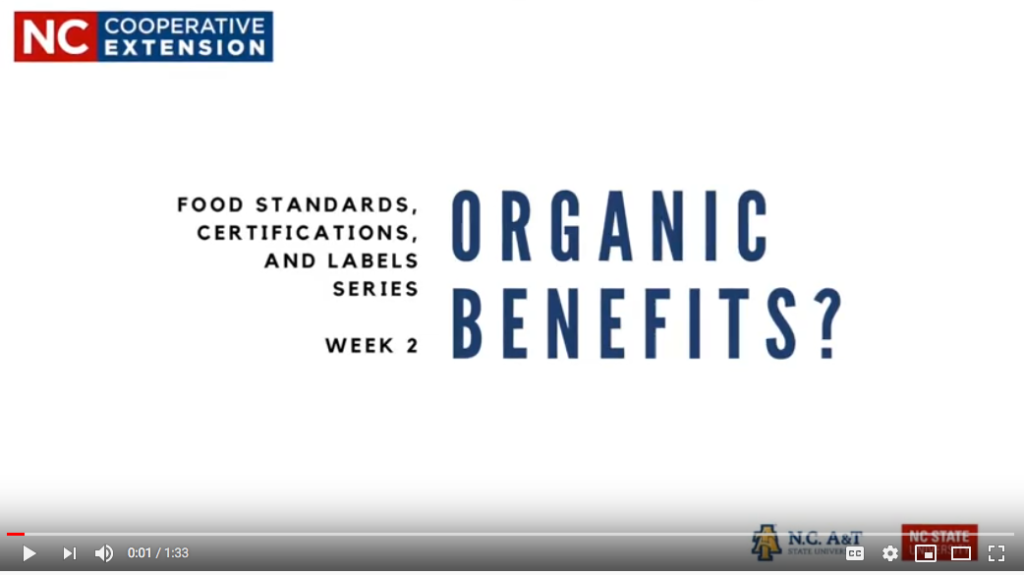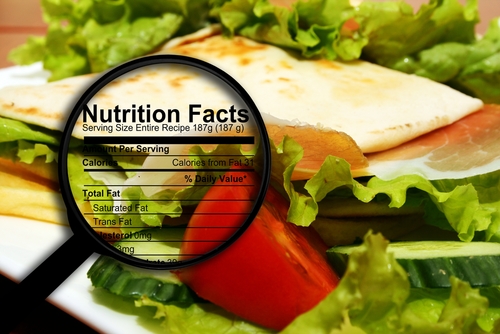41 organic food standards and labels the facts
What Does Organic Mean? The Facts about Organic Food Standards and Labels Only food labeled "organic" has been certified as meeting USDA organic standards. For more detailed information on the USDA organic standards, visit the USDA National Organic Program website or call the National Organic Program at 202-720-3252, or write USDA-AMS-TM-NOP, Room 4008 S. Bldg., Ag Stop 0268, 1400 Independence, SW, Washington, DC 20250. National Organic Program | Agricultural Marketing Service NOP is a federal regulatory program that develops and enforces consistent national standards for organically produced agricultural products sold in the United States.. NOP also accredits third-party organizations to certify that farms and businesses meet the national organic standards.
Organic foods: Are they safer? More nutritious? - Mayo Clinic The USDA guidelines describe organic foods on product labels as:. 100% organic. This label is used on certified organic fruits, vegetables, eggs, meat or other foods that have one ingredient. It may also be used on food items with many ingredients if all the items are certified organic, except for salt and water.

Organic food standards and labels the facts
Organic Food Standards and Labels: The Facts - MedicineNet Only food labeled "organic" has been certified as meeting USDA organic standards. For more detailed information on the USDA organic standards, visit our web site at , call the National Organic Program at 202-720-3252, or write USDA-AMS-TM-NOP, Room 4008 S. Bldg., Ag Stop 0268, 1400 Independence, SW, Washington, DC 20250. Organic Food Statistics About the 2020 Market (Infographic) Jan 02, 2020 · 5. Understanding the meaning behind different organic labels is crucial. (FamilyDoctor) Before you switch, remember one of the most important facts about organic food: know your labels. “100% organic” means the food has been grown and processed using FDA-approved methods and ingredients. 50 Interesting Organic Food Facts | FactRetriever.com Organic food labeling standards are based on the percentage of organic ingredients in a product. Products labeled "100% organic" must contain only organically produced ingredients. Products labeled "organic" must contain at least 95% organically produced ingredients.
Organic food standards and labels the facts. Organic - Open Food Facts Organic food is food produced by methods complying with the standards of organic farming and features practices that cycle resources, promote ecological balance, and conserve biodiversity. Products that have the label Organic 145,193 products Recently modified products Explore products by... Pages: 1 2 3 4 … 1450 1451 1452 Next Organic on Food Labels | FDA Organic on Food Labels FDA does not regulate the use of the term "organic" on food labels. The National Organic Program (NOP) is the federal regulatory framework governing organically produced... Organic Standards | OTA These standards require that products bearing the USDA organic label be grown and processed without the use of toxic and synthetic pesticides and fertilizers, genetic engineering, antibiotics, synthetic growth hormones, artificial flavors, colors, preservatives, sewage sludge and irradiation. Organic Food - FoodFacts 'Organic in conversion' means that the production system of the food has adhered to organic standards for at least one year but which does not qualify as fully organic yet. The process of converting to fully certified organic production could take up to three years. ... At least 95% organic, can carry the label 'organic'. Foods made ...
24 Organic Food Statistics & Facts for a Much Healthier 2022 5.7% of food sold in America is organic, according to facts about organic food. 83% of US citizens will opt for organic, while the number of organic food proponents was 30% six years earlier. 62% of US consumers would purchase organic if it were more affordable. Millennials with children are the most likely to spend money on organic food. Organic Foods - Cleveland Clinic Small food producers who sell less than $5,000 per year may also call themselves organic if they meet these standards. However, they don't have to go through the certification process (but can't label their food as USDA Organic). What does "certified organic" mean? To be certified USDA Organic, farms and food producers must meet certain ... Organic Food: False Labeling Is Not Uncommon | National Review Most alarming is the importation of allegedly organic grains from Ukraine, Turkey, India, and China, countries with uncertain food-safety standards, to use as animal feed. Any organic meat or ... Organic Food Facts You Need to Know Before Deciding to Go ... - GlycoLeap Organic Food Facts 3 | Organic Vs Conventional, Nutritionally the Same. Many people purchase organic food because they believe it is healthier. Some say that organic food tastes better, while some state that they actually taste the same. While organic food has fewer artificial fertilisers, pesticides and is free of antibiotics and hormones ...
Organic 101: What the USDA Organic Label Means Mar 13, 2019 · This is the third installment of the Organic 101 series that explores different aspects of the USDA organic regulations. Amidst nutrition facts, ingredients lists, and dietary claims on food packages, “organic” might appear as one more piece of information to decipher when shopping for foods. So understanding what “organic” really means can help shoppers make informed choices during ... List of food labeling regulations - Wikipedia Food Allergen Declaration FALCPA; By region. FAO GM Foods Platform; Food Administration; Asia India. Food Safety and Standards Authority of India; Thailand. Phuket: "Yellow flag" for vegetarian food during ‘ngan kin jeh’ vegetarian festival; North America Canada. Food and Drugs Act; Monsanto Canada Inc v Schmeiser; Mexico 32 Organic Food Statistics and Facts for a Nutritious 2021 Organic food industry growth statistics show that with a CAGR of 11.1%, the market will reach $98.9 billion by 2024. 16. In 2018, the global organic coffee market was valued at $6.8 billion. (Allied Market Research) With a CAGR of 8.2%, the global organic coffee market is expected to reach $12.6 billion by 2026. Who Buys Organic Food: Different Types of Consumers Nov 20, 2019 · The American Academy of Pediatrics (AAP) released their findings in 2012 on how organic food benefits young children. However, parents have been fans of organic food for years, even before the AAP gave organics a thumbs up. The most recent reports show that U.S. families are increasingly embracing organics in a wide range of categories.
Understanding the USDA Organic Label Understanding what the organic label means can help shoppers make informed purchasing choices. Organic is a labeling term found on products that have been produced using cultural, biological, and mechanical practices that support the cycling of on-farm resources, promote ecological balance, and conserve biodiversity.
The Organic Seal | Agricultural Marketing Service The labeling requirements of the NOP apply to raw, fresh products and processed products that contain organic agricultural ingredients. Agricultural products that are sold, labeled, or represented as organic must be produced and processed in accordance with the NOP standards.

How organic is ORGANIC? (Thanks Holistic Dad for sharing!) | Eating organic, Organic recipes ...
11 Facts About Organic Food | DoSomething.org Industry analysts estimate that US organic food sales were $28 billion in 2012 (over 4 percent of total at-home food sales), up 11 percent from 2011. [6] Products labeled "organic" may reflect higher prices because the production process is often on a smaller scale with more labor- and management-intensive practices and stricter regulations. [7]
Organic food: labelling and advertising rules - GOV.UK When you can label your product as 'organic' You can only label foods as 'organic', or use terms relating to organic production methods, if: at least 95% of the product's agricultural ingredients...
Labeling Organic Products | Agricultural Marketing Service Finished product is certified organic and produced in full compliance with the USDA organic regulations: entire product may be labeled organic and display the USDA organic seal; All instances of specific fibers in finished product are certified organic: label may claim the specific fibers are organic and identify the percentage of organic fibers
Organic Food: Fact vs. Perception | American Heart Association For agricultural products, these requirements include nonuse of hormones, pesticides, irradiation or bioengineering. Animals used for meat, poultry, eggs or dairy products must not receive antibiotics or growth hormones. Organic products are subject to the same USDA safety standards as all other food products.
Organic Food: 1. Introduction - GreenFacts The principles governing organic food in the European Union (EU) are defined in Regulation No 834/2007 and Regulation No 889/2008 on organic production and labelling. This method of production pursues the respect of nature's systems and cycles, a high level of biodiversity, responsible use of energy and natural resources such as water, soil, organic matter and air, and high animal welfare ...
Organic Production/Organic Food: Information Access Tools Organic food is produced by farmers who emphasize the use of renewable resources and the conservation of soil and water to enhance environmental quality for future generations. Organic meat, poultry, eggs, and dairy products come from animals that are given no antibiotics or growth hormones.
What do you Know About Organic Foods? - IFT.org The term organic reflects how a food is produced and processed, not the nutritional make-up of a food. There is a prevailing belief that organic food products are somehow healthier, or better for you, than non-organic or "conventional" products. Recent research, including a 2012 Stanford University study, has confirmed that organic foods ...

Wildway Grain-free Granola, Hot Cereal, & Snack Mixes | Grain free granola, Food labels, Snack mix
Facts about Organic Food that You Didn't Know - Ecolonomics Organic foods are regulated by the U.S. Department of Agriculture (USDA). All food bearing this seal are required to be grown, harvested, and processed according to national standards that include restrictions on types, amounts, and residues of pesticides, hormones, and antibiotics. ( Organic Production and Organic Food: Information Access Tools)
Organic is Non-GMO & More | CCOF - Organic certification, education and outreach, advocacy and ...
Organic food - Wikipedia Organic food, ecological food or biological food are food and drinks produced by methods complying with the standards of organic farming. Standards vary worldwide, but organic farming features practices that cycle resources, promote ecological balance, and conserve biodiversity.
All About Organic Foods | Food Safety and Health · We share the relevant. You must look at package labels and watch for signs in the supermarket. Along with the national organic standards, USDA developed strict labeling rules to help consumers know the exact organic content of the food they buy. The USDA Organic seal also tells you that a product is at least 95 percent organic. Single-ingredient foods

Food Industry Labels and Organic Certification Video Series | North Carolina Cooperative Extension
Organic Foods: What You Need to Know - HelpGuide.org If you can afford to pay the higher prices, look for beef and dairy products labeled "pasture raised" or "100% grass fed." For pork, chicken, or eggs, look for a "certified organic" label. You may find that buying cheaper cuts of meat from organically raised animals enables you to eat organic without breaking your food budget.
50 Interesting Organic Food Facts | FactRetriever.com Organic food labeling standards are based on the percentage of organic ingredients in a product. Products labeled "100% organic" must contain only organically produced ingredients. Products labeled "organic" must contain at least 95% organically produced ingredients.
Organic Food Statistics About the 2020 Market (Infographic) Jan 02, 2020 · 5. Understanding the meaning behind different organic labels is crucial. (FamilyDoctor) Before you switch, remember one of the most important facts about organic food: know your labels. “100% organic” means the food has been grown and processed using FDA-approved methods and ingredients.
Organic Food Standards and Labels: The Facts - MedicineNet Only food labeled "organic" has been certified as meeting USDA organic standards. For more detailed information on the USDA organic standards, visit our web site at , call the National Organic Program at 202-720-3252, or write USDA-AMS-TM-NOP, Room 4008 S. Bldg., Ag Stop 0268, 1400 Independence, SW, Washington, DC 20250.










Post a Comment for "41 organic food standards and labels the facts"